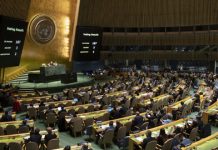Photo credit: DiasporaEngager (www.DiasporaEngager.com).
N’Djamena, 16 October – The International Organization for Migration (IOM) is stepping up its efforts to support communities severely affected by widespread flooding in Chad, which has displaced over 13,000 people and left nearly two million people in need of urgent assistance. N’Djamena alone hosts 5,137 individuals displaced, accounting for nearly a half of the total displacement from the floods.
As of 1 October, the floods, concentrated in the capital N’Djamena and southern regions along the Chari River, have severely limited access to clean water and sanitation, posing a risk of waterborne diseases, and exacerbating the challenges faced by displaced families. As part of a larger regional crisis affecting 6.6 million people across West and Central Africa, the situation in Chad remains critical.
“In the wake of devastating floods that have affected nearly two million people in Chad, the needs continue to grow.” said Pascal Reyntjens, Chief of Mission at IOM Chad. “Our teams are on the ground, coordinating with local authorities and partners to ensure that the assistance provided directly addresses the critical needs of those hardest hit.”
IOM’s response has so far reached approximately 14,000 people across the Lake Chad region and N’Djamena. The Organization has been providing shelter and bedding, lighting, cooking and household kits. IOM has also been delivering essential water, sanitation, and hygiene support, including the installation of latrines to improve sanitary conditions in displacement sites. In collaboration with Chad’s National Commission for Refugee Reintegration (CNARR) and key humanitarian actors, IOM has mobilized rapid response teams to conduct needs assessments and register displaced individuals. Using its Displacement Tracking Matrix (DTM), IOM is actively tracking the needs of displaced communities to inform humanitarian response and provide essential assistance.
Ongoing efforts are underway to gather comprehensive data across affected regions, ensuring that no one is left behind in the response.
“The floods have taken everything from us,” said Anassa, a resident of N’Djamena who was displaced by the flooding. “With a roof over our head and clean water, we can start to rebuild our lives.”
IOM, along with its partners, is calling for increased support to meet the immediate and long-term needs of flood-affected populations in Chad. The scale of the disaster requires a coordinated and sustained response to help families like Anassa’s rebuild their lives.
Note to Editor
The impact of climate change, disasters and environmental degradation are increasingly influencing migration patterns, especially among vulnerable populations. At COP29, people must be at the heart of the discussions. IOM urges leaders to take concrete actions that protect and support those who want to stay, those on the move, and those needing or wanting to move.
For more information, please contact:
In Chad: Christina Van Hooreweghe, cvanhooreweg@iom.int
In Dakar: Joëlle Furrer, jfurrer@iom.int
In Geneva: Kennedy Okoth, kokoth@iom.int
Source of original article: International Organization for Migration (www.iom.int).
The content of this article does not necessarily reflect the views or opinion of Global Diaspora News (www.GlobalDiasporaNews.com).
To submit your press release: (https://www.GlobalDiasporaNews.com/pr).
To advertise on Global Diaspora News: (www.GlobalDiasporaNews.com/ads).
Sign up to Global Diaspora News newsletter (https://www.GlobalDiasporaNews.com/newsletter/) to start receiving updates and opportunities directly in your email inbox for free.





























